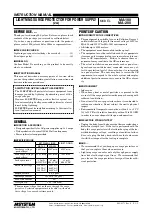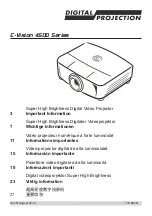
1. IMPORTANT SAFEGUARDS
Electric energy can perform many useful functions.
This projector has been engineered and manufactured to meet
applicable safety standards. IMPROPER USE CAN RESULT IN
POTENTIAL ELECTRICAL SHOCK OR FIRE HAZARDS. In order
not to defeat the safeguards incorporated into this projector,
observe the following basic rules for its installation, use and
servicing.
1.
Unplug the projector from the wall outlet before cleaning or
lamp replacement.
2.
Do not use liquid cleaners or aerosol cleaners. Use a soft
dry cloth to clean the projector unit. If the unit is very dirty,
wet a cloth with neutral detergent, squeeze it tight, wipe
the unit with it, and finish by wiping with a dry cloth.
Do not use a chemical duster or polisher-cleaner because it
can adversely affect the unit and peel the paint.
3.
Do not use attachments not recommended by PHILIPS, as
they may cause hazards.
4.
Do not use the projector near water- for example, near a
bathtub, washbowl, kitchen sink, or laundry tub, in a wet
basement, near a swimming pool, etc. Never spill liquid
into the projector.
5.
Do not place the projector on an unstable cart, stand, or
table. The projector may fall, which may cause serious
injury to a child or an adult and/or serious damage to the
unit. Use only with a cart or stand recommended by its
manufacturer as being suitable for use with a projector.
6.
Ceiling, wall or shelf mounting should be done with a
mounting kit approved by the manufacturer for use with a
projector and should follow the manufacturer’s instructions.
7.
Projector equipment and cart combinations should be
moved with care. Quick stops, excessive force, and uneven
surfaces may cause the equipment and cart combination to
overturn.
8.
Slots and openings in the sides and bottom of the cabinet
are provided for ventilation. To ensure reliable operation of
the projector and to protect it from overheating, these
openings must not be blocked or covered. These openings
should never be covered with cloth or other material. The
bottom opening should not be blocked by placing the
projector on a bed, sofa, rug, or other similar surface. The
projector should not be placed near or over a radiator or
heating vent. The projector should not be placed in a built-
in installation such as a bookcase unless proper ventilation
is provided.
9.
The projector should be operated only from the type of
power source indicated on the back of the projector or in
the specifications and with the appropriate powercord. If
you are not sure of the type of power supplied to your
business or the right type of powercord, consult your
projector dealer or local power company.
10.
Do not allow anything to rest on the powercord. Do not
place the projector where the cord will be walked on.
11.
Follow all warnings and instructions marked on the
projector.
12.
As a safety feature, this projector is equipped with
powercord with a 3-pin grounded plug (for USA-versions
only) or a 2-pin grounded plug (for European versions only).
The 3-pin/2-pin grounded plug will fit only into a grounding
type power outlet. If the plug does not fit, use an adapter
that is properly grounded or have an electrician install a
grounded type outlet. Do not attempt to modify this AC
plug.
13.
For added protection of the projector during a lightning
storm, or when it is left unattended or not in use for long
periods of time, unplug it from the wall outlet and
disconnect any cable systems. This will prevent damage to
the projector due to lightning and power-line surges.
14.
Do not overload wall outlets and extension cords with too
many products, because this can cause a fire or electric
shock.
15.
Never push objects of any kind into the projector through
cabinet slots as they may touch dangerous voltage points
or short cut parts, which could result in a fire or electric
shock.
16.
Do not attempt to service the projector yourself other than
maintenance issues presented in chapter ‘ADDITIONAL
INFORMATION/Maintenance’. Opening or removing covers
may expose you to dangerous voltage or other hazards.
Refer all servicing to qualified service personnel.
17.
Unplug the projector from the wall outlet and refer
servicing to qualified service personnel under the following
conditions:
A.
When the powercord or plug is damaged or frayed.
B.
If liquid has been spilled into the projector.
C.
If the projector has been exposed to rain or water.
D.
If the projector does not operate normally when you
follow the operating instructions. Adjust only those
controls that are covered by the operating instructions;
improper adjustment of other controls may cause
damage and will often require extensive work by a
qualified technician to restore the projector to normal
operation.
E.
If the projector has been dropped or the cabinet has
been damaged.
F.
When the projector exhibits a distinct change in
performance – (this indicates a need for service).
18.
Upon completion of any service or repairs to the projector,
ask the service technician to perform a routine safety check
to check that the projector is in safe operating condition.
19.
When replacement parts are required, be sure the service
technician has used replacement parts specified by the
manufacturer that have the same characteristics as the
original parts. Unauthorized substitutions may result in fire,
electric shock, or other hazards.
20.
It is recommended to clean the air filter after every 100
lamp hours. The projector may become too hot if the filter
is not cleaned when required.
21.
If the lens becomes dirty or smudged, clean it with a clean,
dampened cloth. Never touch the lens with your fingers.
22.
Do not look directly into the aperture and lens while
operating the projector as this may damage your eyes.
1
CAUTION: Please read all of these instructions before you operate
your projector. Save these instructions for future
reference
.
S




































